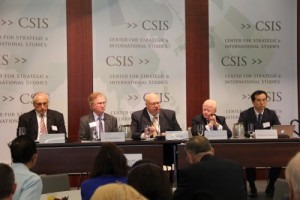SEA gov’ts must tackle hurdles of small businesses – D.C. panel

“Small Businesses: The Key to Growth” panelists: Kazumi Nishikawa, special advisor to the Minister for Economy, Trade and Industry in Japan and Executive Director of JETRO Singapore; Philippine Ambassador to the United States, Jose L. Cuisia, Jr.; Dr. James Morrison, special assistant for Congressional and Intergovernmental Affairs of the US Overseas Private Investment Corporation; and Bernard Bailey, chairman and CEO of Authentix. Scott Miller, William M. Scholl Chair in International Business at CSIS moderated the discussion. PH EMBASSY PHOTO
WASHINGTON, D.C. — Small and medium enterprises (SMEs), increasingly vital to the economy of Association of South East Asian Nations (ASEAN) countries — with SMEs accounting for almost all of business in the Philippines — are facing challenges that governments and the private sector must deal with.
This was the consensus among speakers on the “Small Businesses: The Key to Growth” panel at the Asian Architecture Conference at the Center for Strategic and International Studies (CSIS) on September 22.
The Conference brought together key thought leaders, business executives, and policy makers from the United States and Asia for talks on important issues surrounding the East Asia Summit (EAS) and Asia Pacific Economic Cooperation (APEC).
Among the panelists were Kazumi Nishikawa, special advisor to the Minister for Economy, Trade and Industry in Japan and Executive Director of JETRO Singapore; Philippine Ambassador to the United States Jose L. Cuisia, Jr.; Dr. James Morrison, Special Assistant for Congressional and Intergovernmental Affairs of the U.S. Overseas Private Investment Corporation; and Bernard Bailey, chairman and CEO of Authentix. The discussion was moderated by Scott Miller, William M. Scholl Chair in International Business at CSIS.
Gap in trade
According to Ambassador Cuisia, there is a gap between the contribution of SMEs in the ASEAN economy and their share in international trade, which he said is indicative of challenges being faced by SMEs in their respective countries.
“In ASEAN, SMEs form the backbone of our economies, comprising more than 96 percent of all enterprises and contribute 30 to 35 percent of GDP. They constitute the largest source of domestic employment—from 50 to 95 percent of jobs in the region—across all economic sectors and in both rural and urban areas. However, they only account for 19 to 31 percent of the exports of this dynamic and productive region,” said Cuisia.
There has been a steady increase in the number of SMEs in the Philippines, but these businesses continue to face several challenges.
“In the Philippines, SMEs account for 99 percent of the business and contribute 65 percent of the jobs generated by all types of business establishments. They grew by 66 percent from 492,510 in 1995 to 816,759 in 2011. Similarly, the numbers of those employed by these firms have grown by 45.7 percent from 2.7 million in 1995 to 3.9 million in 2011,” said Cuisia.
He added, “These growth figures mask challenges faced by SMEs. Many Philippine SMEs remain too small, only meagerly augment household incomes, and are unable to take advantage of opportunities brought about by globalization or ASEAN integration.”
Growth constraints
Constraints to further SME growth and productivity include limited access to finance, technology and skills; persistence of information environments; difficulties with product quality and marketing; and other challenges related to an economic playing field that is not level between large and small firms.
“To go beyond survival and actually compete, SMEs will also need to undergo successful business transformation in various dimensions of their operations—spanning enhanced entrepreneurial skill, innovation in process and product development, more successful collaboration across SMEs and with larger firms and improved crisis resilience among other factors,” said Cuisia.
According to Mishikawa, Asian governments are seeing the importance of SMEs and are collectively focusing on SME utilization, making them more competitive in the global market.
APEC host
The Philippines is hosting APEC this year, and it has consistently taken the position that there needs to be specific, concrete and practical interventions to provide SMEs wide opportunities to integrate into global or regional trade.
“In our hosting of APEC this year, we have placed SMEs front and center. We encouraged the other APEC economies to improve institutional support systems for SMEs. We have argued for promoting and harnessing synergistic linkages between SMEs and large firms, as well as enabling the SMEs to benefit from regional economic integration. Simply put, we want APEC to look at global trade through the prism of SMEs,” said Cuisia.
The Asian Architecture Conference was organized by CSIS with support from the government of Japan and the National Center for APEC.
Like us on Facebook